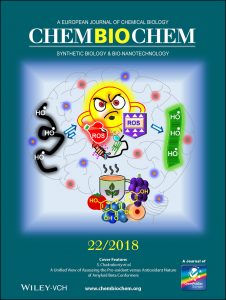OXFORD, Miss. – The fall semester was kind to University of Mississippi researcher Saumen Chakraborty, who received a National Institutes of Health award and earned the cover of a scientific journal.
Chakraborty, an assistant professor in the UM Department of Chemistry and Biochemistry, was awarded a $317,198 grant from the NIH in September to study a class of enzymes that could lead to significant advances in alternate energy research.
He also landed a recent cover of ChemBioChem, a European-based, peer-reviewed journal that focuses on the fields of chemical biology, bio(in)organic chemistry, biochemistry, synthetic biology, bio-nanotechnology and biomaterials. The paper addresses Chakraborty’s research into the development of Alzheimer’s disease.
Chakraborty’s NIH award, titled “Artificial Hydrogenases Via Rational Metalloprotein Design,” was awarded through the National Institute of General Medical Sciences, which supports research that increases the understanding of biological processes and lays the foundation for advances in disease diagnosis, treatment and prevention.
Assisting Chakraborty, who joined the Ole Miss faculty in July 2016, in his NIH research are two chemistry graduate students: Dhanashree Selvan and Pallavi Prasad.
The trio is using the award, No. R15GM13126, to design artificial metal-containing enzymes that can mimic the structures and functions of complex enzymes in nature. The particular enzymes involved in the research are hydrogenases, which serve as the energy source for certain organisms and have tremendous potential in alternate energy research.
“Our goal for this project is to learn from nature and design artificial hydrogenases that can potentially serve as an alternate energy source,” Chakraborty said. “We also aim to use our artificial proteins to understand the reaction mechanisms.”
 Landing the ChemBioChem cover – the paper is titled “A Unified View of Assessing the Pro-oxidant versus Antioxidant Nature of Amyloid Beta Conformers” – was exciting, Chakraborty said, “especially since this is our first paper in this area.” Two UM chemistry graduate students, Suchitra Mitra and Prasad, were listed with Chakraborty as co-authors of the ChemBioChem cover.
Landing the ChemBioChem cover – the paper is titled “A Unified View of Assessing the Pro-oxidant versus Antioxidant Nature of Amyloid Beta Conformers” – was exciting, Chakraborty said, “especially since this is our first paper in this area.” Two UM chemistry graduate students, Suchitra Mitra and Prasad, were listed with Chakraborty as co-authors of the ChemBioChem cover.
Amyloid beta is a peptide, or an amino acid chain, that is thought to be involved in causing Alzheimer’s disease, Chakraborty said. The peptide is prone to aggregation and can adopt different physiological forms and sizes, with each state making a different impact on the disease.
This peptide also produces toxic reactive oxygen species when bound to transition metals such as copper and iron.
The paper discusses how the group “investigated how and to what extent these different forms of the peptide produce these toxic species,” Chakraborty said. The research is helpful in potentially understanding the manner of development of Alzheimer’s disease.
“It is exciting to see one of the newest faculty members in the department secure their first major grant and take a significant step towards establishing an independent scientific career here as a member of the Ole Miss family,” said Greg Tschumper, professor and chair of the Department of Chemistry and Biochemistry. “The NIH award is a noteworthy achievement because Dr. Chakraborty was competing against researchers from across the country for a limited amount of funding.
“We are proud of the positive recognition Dr. Chakraborty is bringing to his lab and our department.”
The award and cover top off a successful 2018 for Chakraborty, who earlier this year received a Ralph E. Powe Junior Faculty Enhancement Award from Oak Ridge Associated Universities.
He was the fourth Ole Miss faculty member to receive the competitive research award that provides seed money for junior faculty members. Oak Ridge Associated Universities provided $5,000 for the one-year grant, with the university’s Office of Research and Sponsored Programs providing a $5,000 match.
